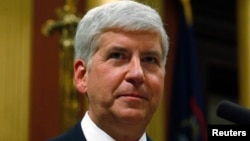DETROIT —
Michigan Governor Rick Snyder unveiled a proposal on Thursday that calls for the U.S. government to allocate 50,000 special visas over the next five years to lure highly skilled immigrants to live and work in the bankrupt city of Detroit.
Snyder's plan, which would need to be implemented by the U.S. government, is aimed at bringing jobs to the city while stemming an exodus of residents.
Detroit's population has fallen to about 700,000 from a peak of 1.8 million in 1950, and Snyder highlighted the amount of opportunity available to newcomers to Detroit.
The EB-2 visas would be aimed at individuals with advanced degrees and exceptional skills in fields like the auto industry, information technology, healthcare and life sciences, Snyder said at an event announcing the proposal.
EB-2 visas allow individuals with special talents to enter the country without a job offer.
There is no precedent for special visas to be issued for a specific geographic area, Snyder said. But he compared the program to a current one that grants visas to physicians who agree to work in under-served areas.
To move forward with his plan, Snyder would need the support of the Obama administration and to accomplish an expansion of immigration policy at a time when immigration reform is one of the most contentious political issues.
Snyder, who will be in Washington on Friday, said he would meet privately with Obama administration officials. Though “it's really early in the process,” Snyder was hopeful the administration would be able to act unilaterally without requiring legislation.
“It's really taking up the offer of the federal government that they want to help more,” Snyder told reporters. “Again, they made it clear they don't have dollar resources to necessarily help, but isn't this a great way that doesn't involve large-scale financial contributions from the federal government to do something dramatic in Detroit?”
The Republican governor was joined by Detroit's Democratic Mayor Mike Duggan and Detroit city council members to announce the plan.
Snyder is asking that 5,000 visas be issued in the first year, with 10,000 in each of the next three years, and 15,000 in the fifth year.
The program would target individuals looking to move to the United States as well as those already in the country.
Snyder called attention to more than 25,000 international students who study at colleges and universities in Michigan, which has faced the problem of a “brain drain” of recent college graduates.
“Where else in the U.S. could you find a house or a lot for the prices you're going to find here? It's a good deal,” Snyder said.
Snyder's plan, which would need to be implemented by the U.S. government, is aimed at bringing jobs to the city while stemming an exodus of residents.
Detroit's population has fallen to about 700,000 from a peak of 1.8 million in 1950, and Snyder highlighted the amount of opportunity available to newcomers to Detroit.
The EB-2 visas would be aimed at individuals with advanced degrees and exceptional skills in fields like the auto industry, information technology, healthcare and life sciences, Snyder said at an event announcing the proposal.
EB-2 visas allow individuals with special talents to enter the country without a job offer.
There is no precedent for special visas to be issued for a specific geographic area, Snyder said. But he compared the program to a current one that grants visas to physicians who agree to work in under-served areas.
To move forward with his plan, Snyder would need the support of the Obama administration and to accomplish an expansion of immigration policy at a time when immigration reform is one of the most contentious political issues.
Snyder, who will be in Washington on Friday, said he would meet privately with Obama administration officials. Though “it's really early in the process,” Snyder was hopeful the administration would be able to act unilaterally without requiring legislation.
“It's really taking up the offer of the federal government that they want to help more,” Snyder told reporters. “Again, they made it clear they don't have dollar resources to necessarily help, but isn't this a great way that doesn't involve large-scale financial contributions from the federal government to do something dramatic in Detroit?”
The Republican governor was joined by Detroit's Democratic Mayor Mike Duggan and Detroit city council members to announce the plan.
Snyder is asking that 5,000 visas be issued in the first year, with 10,000 in each of the next three years, and 15,000 in the fifth year.
The program would target individuals looking to move to the United States as well as those already in the country.
Snyder called attention to more than 25,000 international students who study at colleges and universities in Michigan, which has faced the problem of a “brain drain” of recent college graduates.
“Where else in the U.S. could you find a house or a lot for the prices you're going to find here? It's a good deal,” Snyder said.





